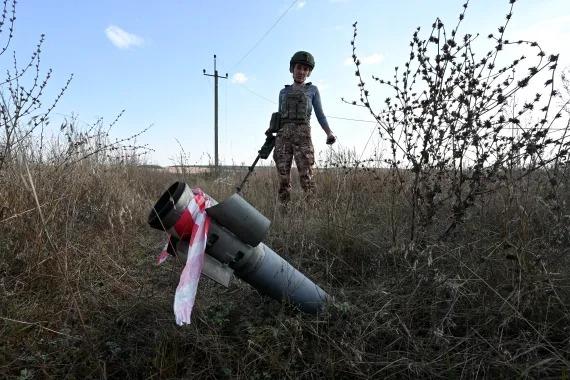In the relentless saga of the Russia-Ukraine war, day 588 unfolds with a myriad of events and escalating tensions. From clashes at the front lines to international diplomacy, this report encapsulates the pivotal occurrences of Wednesday, October 4, 2023.
Escalating Clashes in the Conflict Zone
The situation remains precarious, with both sides accusing each other of provocations and attacks. The governor of Russia’s Bryansk region has raised a grave allegation against Ukraine, asserting that cluster munitions were used in an assault on the Russian village of Klimovo, located near the Ukrainian border. Although no casualties were reported, several houses in the village suffered damage. Meanwhile, the Ukrainian Air Force claimed to have thwarted 29 out of 31 drones and a cruise missile launched by Russia. These attacks targeted regions including Mykolaiv and Dnipropetrovsk and lasted for more than three harrowing hours. Unfortunately, falling debris from destroyed Russian drones ignited fires in Dnipro and an industrial facility in Pavlograd, both located in Ukraine’s eastern Dnipropetrovsk region. Thankfully, firefighters managed to quell both blazes without any initial reports of casualties. Further adding to the turmoil, power outages affected at least five settlements in Ukraine’s Zaporizhia region, a consequence of Russian shelling. Additionally, Russian forces attempted, albeit unsuccessfully, to regain lost positions near Mala Tokmachka and Verbove in the Zaporizhia region over the past 24 hours.
Military Mobilization and Diplomatic Maneuvers
Amidst the intensifying hostilities, Ukrainian President Volodymyr Zelenskyy paid a visit to troops on the front lines, engaging in discussions about the military situation with commanders in Ukraine’s northeast, where the conflict rages on relentlessly. On the Russian side, the Defense Ministry reported the successful interception of a Ukrainian “Neptune” missile off the coast of Crimea. Meanwhile, Russian aerial attacks inflicted injuries on three individuals in Ukraine’s Kherson region, specifically in the Antonivka area.
A significant revelation from Russia’s Defense Minister, Sergei Shoigu, highlights a substantial increase in military recruitment. Since the beginning of 2023, approximately 335,000 individuals have enlisted in military service through contracts with the Russian armed forces and volunteer groups. Notably, 50,000 of these enlistments occurred in the month of September alone. Furthermore, draft plans unveiled by the Russian government project a substantial allocation of resources to the defense sector in the upcoming year. In 2024, Russia’s defense expenditure is poised to encompass almost one-third of the country’s total budget, amounting to a staggering 10.78 trillion roubles ($109 billion), constituting 29.4 percent of the overall planned expenditure of 36.66 trillion roubles.
International Response and Diplomatic Endeavors
On the international front, the United States is gearing up to provide military aid to Ukraine. Reports indicate preparations to send Army Tactical Missile System (ATACMS) missiles armed with cluster munitions, once approved by President Joe Biden. These missiles, with a range of approximately 300 kilometers (186 miles), bolster Ukraine’s capacity to target Russian assets beyond the immediate front lines. However, a shadow of uncertainty looms over this assistance, as the White House has cautioned that US aid for Ukraine will run dry in “a couple of months” unless Republican hardliners pass new funds for Kyiv. President Biden has called upon Republican House of Representatives Speaker Kevin McCarthy to expedite the process, emphasizing that support for Kyiv must remain uninterrupted “under any circumstances.”
Furthermore, President Biden has engaged in a flurry of diplomatic outreach, conversing with leaders from various countries and international organizations. These discussions encompassed key partners such as Canada, Germany, Italy, Japan, Poland, Romania, the United Kingdom, and France, as well as the heads of NATO, the European Commission, and the European Council. Meanwhile, UK Prime Minister Rishi Sunak pledged unwavering support to Ukraine, offering military, humanitarian, and economic assistance “for as long as it takes.”
Complex Diplomatic Entanglements
Intricacies of international diplomacy continue to evolve, as Slovakia’s foreign minister asserted that Ukraine must first emerge victorious against Russia before pursuing NATO and EU membership. This stance reflects the prevailing opinion that Ukraine’s sovereignty and territorial integrity must be fully restored before further integration with Western institutions. On a related note, the EU is exploring avenues to incentivize Hungary’s approval of aid to Ukraine. This includes the prospect of unlocking substantial financial support for Hungary, potentially paving the way for Kyiv’s EU membership talks. Hungary’s current actions, particularly in relation to its courts’ independence, have led to concerns within the EU.
Additionally, Russia’s Ministry of Foreign Affairs has announced an entry ban for certain individuals directly implicated in restricting freedom of speech and the rights of Russian journalists in Moldova, citing their involvement in inciting anti-Russian sentiments. This move underscores the complexity of Russia’s regional relations and the broader geopolitical landscape.
Domestic Developments and Economic Impact
Turning inward, there are intriguing developments on the domestic front in Russia. Speculations abound that President Vladimir Putin may soon declare his candidacy for the 2024 presidential polls, potentially extending his hold on power until the age of 77. Meanwhile, in a courtroom far from the battlefield, Russian prosecutors have requested a nine-and-a-half-year jail sentence for former state TV journalist Marina Ovsyannikova, who gained notoriety for her on-air protest against the war. She is charged with disseminating “fake news” challenging Moscow’s official narrative regarding the conflict.
Finally, the economic repercussions of the Russia-Ukraine war are becoming increasingly apparent. Carlsberg has terminated its license agreements in Russia in response to Moscow’s takeover of its breweries. Nevertheless, the Danish company will permit Baltika Breweries, a Russian beer manufacturer, to use existing stock and materials until April 1. On the Ukrainian front, efforts are underway to expedite grain exports, with Ukraine, Poland, and Lithuania collaborating on a plan to facilitate these exports. Additionally, Kyiv is in discussions with the World Bank for a $700 million loan to provide emergency support to its agricultural sector in the coming years.
Amidst these multifaceted developments, the conflict between Russia and Ukraine remains a poignant reminder of the enduring challenges that confront the international community in the quest for peace and stability.















